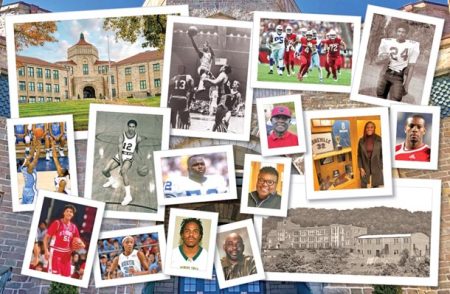Slave Deeds of Buncombe County on Display at UNCA
 Since February, 2012 the exhibit “Slave Deeds of Buncombe County” has been traveling to significant sites for public viewing. Beginning at the Register of Deeds in February 2013, the exhibit continued to Pack Memorial Library and later the YMI Cultural Center, where each stop included teacher training opportunities.
Since February, 2012 the exhibit “Slave Deeds of Buncombe County” has been traveling to significant sites for public viewing. Beginning at the Register of Deeds in February 2013, the exhibit continued to Pack Memorial Library and later the YMI Cultural Center, where each stop included teacher training opportunities.
The final stop of the year-long tour will be at the Intercultural Center at UNC Asheville January 20 – February 28, 2014. The exhibit includes the original bound book of bills of sale for enslaved people and wills from the Clerk of Courts along with a recorded reading station, by actor Becky Stone, of the testimony of Sarah Gudger taken from the Federal Writer’s Project Slave Narratives through the Library of Congress.
This project began in the summer of 2000 with the research work of local students from Asheville, Reynolds, and Roberson High Schools who located the deeds on microfiche files. Once having learned about the records, Drew Reisinger, the newly elected Register of Deeds, worked to have the digitized versions placed on the county website. This effort won two awards from the local Preservation Society and the National Council of State Archivists.
Reisinger sees other national possibilities. “While we are glad to have this resource available, we realized early on in this project that we need a national database of slavery records. Most courthouses throughout the south have records of slavery collecting dust on their shelves. We are asking for people to make these records publicly available by placing them online.
“A handful of counties are well on their way to doing just that. And as more of these documents are becoming available we hope that the United States Congress will consider funding a database that will compile these records in one central place for everyone to have the ability to research them online.”
Deborah Miles, Director of the Center for Diversity Education at UNC Asheville, adds, “For the K-12 school system, primary source documents and critical thinking are at the core of the Common Core—the curriculum of the classroom in most every state in the U.S. Making these documents available in every county, sometimes with the research work of high school and college students, teaches students to be the historians of the present and the future. I hope that teachers in former slave holding states will see the value of students becoming diggers of history and not just passive recipients.”
Pam Smith, a family historian who works at the Smithsonian Institution, says, “I have spent more than 20 years discovering the many names of my enslaved ancestors. It is not an easy task. Just imagine how much more quickly researchers would be able to learn this information if [this were happening] in every part of the nation, with the involvement of genealogists, historians, and others.
“A common misperception in our country is that African Americans are the only people who need these records. That isn’t true. Our country’s past is an American story and all Americans should understand the role their own families played if we are to heal. To do this, we need universal access to the documents.”
Opening reception, Wednesday, February 5, 2014 from 5 – 6:30 p.m. The Buncombe County “Slave Deeds” exhibit is free and open to the public. To inquire about the opening reception and additional programming, email Marianne Martinez at [email protected].






